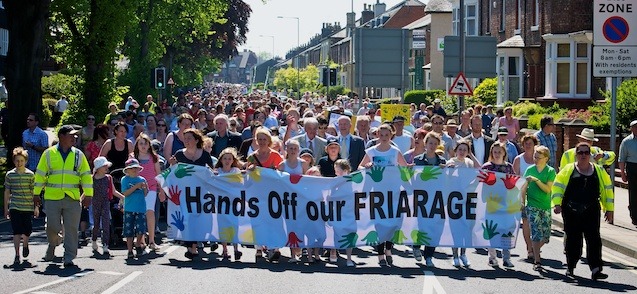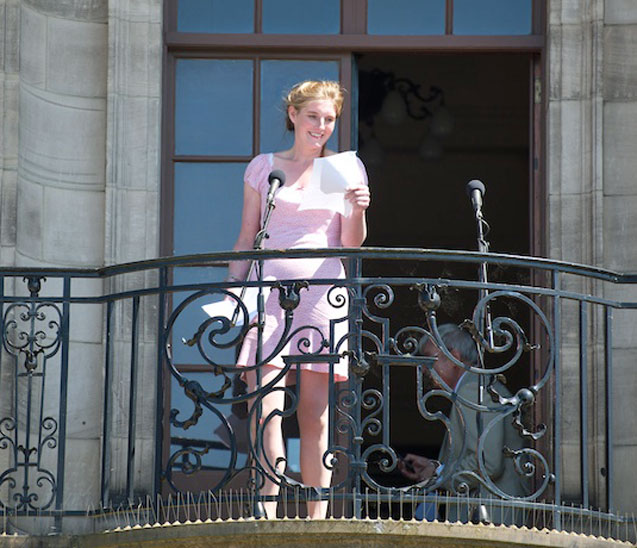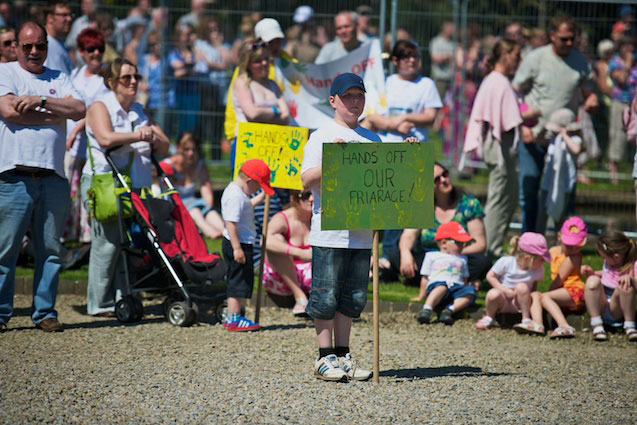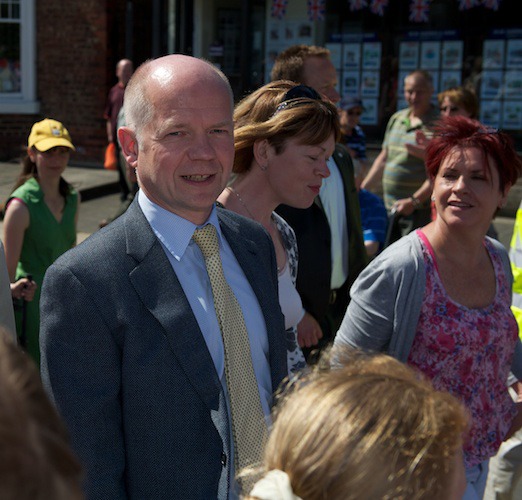
Thousands joined a rally in Northallerton on Saturday 26 May to save the Friarage hospital’s children’s and maternity services.
The rally congregated at 2pm outside County Hall where a number of speakers addressed the crowds, Councillor Blackie opened the event with William Hague MP being the keynote speaker.
Amanda Owen, who has featured on the ITV program, The Dales talked about her experiences. Amanda and her husband are bringing up 5 children on a farm on a remote part of the dales. Amanda has only made it to the Friarage to deliver on one occasion.
 Amanda Owen – bringing up 5 children in a remote part of the Dales
Amanda Owen – bringing up 5 children in a remote part of the Dales
The rally then marched from the County Hall, down the busy main Northallerton High Street, past the Friarage, before congregating on the Bullamoor Memorial Park. Mr Hague accompanied the rally throughout finding time to talk to people along the way.
Full transcript of Willam Hague’s speech:
Let me start by thanking you for coming to today’s Family Rally and March. I am delighted so many people have turned out to demonstrate their support for a place we all feel very strongly about and are determined to preserve; the Friarage Hospital. We owe a huge gratitude to those who have made today possible including all the campaign groups and councils who have supported the rally. I would like to pay particular thanks to the County Council for loan of the County Hall grounds, and Ringways and Hatton Traffic Management for kindly giving their services for free. Finally, special thanks must go to Alex Sutcliffe who has been indispensable in bringing everything together.
The great attendance shows the immense public concern and affection for the Friarage Hospital. Tens of thousands of people will have visited the Friarage over many decades. Some will have been there several times, for different reasons, and nearly all of them will remember receiving an outstanding service. This is particularly true of the maternity and children’s services. These have an excellent local reputation. That reputation deserved. They are fantastic and the people of this area want to keep them.
In one letter I received recently, a mother recalled the traumatic occasion when her son stopped breathing. He was rushed to A&E before being transferred to the Friarage Children’s Unit where he was placed under close supervision for three days before being sent home. The 24/7 care he received was described simply as exceptional. I receive similar letters praising the quality of care at the Friarage on a regular basis. This hospital really matters to local people and it clearly matters enough to you to come out and express your support today. We all want to see such exceptional care continue at the Friarage. That includes a 24/7 maternity unit. You and your children-to-be are entitled to nothing less.
It is for precisely that reason that I am calling on South Tees Trust to do two things. First, they should produce a positive vision of the future of the Friarage Hospital. This does not just mean maternity and children’s services and it certainly does not mean a short piece of paper or a few words. We mean a detailed and comprehensive proposal that people can study, that spells out the Trust’s plans for future services. This proposal would go a long way to help alleviate fears that this vitally important resource for thousands of people will remain so for many years to come. So let us have the vision; loud, clear, detailed and sincere.
Second, I am calling on the Trust and the Clinical Commissioning Group to do what is necessary they can to ensure the Friarage retains a consultant-led maternity unit. It is fair to say that there are legitimate challenges facing the current model of children’s services. These have to be addressed or there is a risk the Friarage will provide sub-standard levels of care. At worst, there is the possibility of another unplanned closure like the one we experienced in 2009. Neither is acceptable, to you, to me, and to the doctors at the hospital.
Much of the problem stems from the changing nature of paediatric provision which is becoming more specialised. However, I believe very strongly that these are difficulties to be overcome, not to be surrendered to. Similar sized maternity units around the country have survived by working with other hospitals in their area or by developing their nursing skills. The situation at the Friarage may require a totally unique solution. If it does, it is the job of local NHS managers to solve the problem, not to give in to it.
It is essential that the current levels of maternity services are maintained for three powerful reasons. The first is the very long distances people would have to travel if current services at the Friarage were downgraded. I have received a huge volume of letters about this issue; it is obviously of great concern to a vast number of people. Patients already have to travel long distances to be treated at the Friarage, often through difficult weather conditions including heavy snow and icy roads. They accept that this is part of living in a rural area.
It is unacceptable, however, that they should be expected to travel even further than they currently do, for maternity services. For a mother-to-be from Hawes asked to travel to the James Cook in Middlesbrough this would mean a journey time of at least 1 hour and 45 minutes. In difficult conditions, which you know are a common feature of life here, this journey would take even longer.
In a recent letter a constituent from Leyburn asked: ‘Is it really thought acceptable to have people living in Hawes drive a 104 mile round trip to hospital or those in Leyburn an 80 mile round trip to have a baby or visit a sick child?’ She is right. Such a situation is categorically not acceptable to me. Not only would these journeys present a huge inconvenience to many families, placing a great strain on what may already be a difficult and stressful time, but they are too long on the grounds of safety and reliability. Far from improving the standard of care at the Friarage these changes would make many worse off when it comes to accessing maternity and children’s services.
This brings me to my second reason. It is true that healthcare is becoming increasingly specialised and that is to be welcomed when it leads to improved outcomes. But this does not mean that the most vital services for any community should be concentrated in the most populated spots; people living in rural areas are just as entitled to accessible healthcare as those who live in urban areas.
Why should the great-grandmother, who wrote to me from Hawes, expect her great-grandchildren to be delivered at the James Cook in Middlesbrough, adding a further 40 minutes to her family’s current journey time? Her latest great-grandchild only just made it to the Friarage in time after a short labour. She is right to feel anxious at the prospect of her next great-grandchild being born in the back of a car without appropriate medical help. The Trust and Clinical Commissioning Group must remember that local health services exist for local people, not the other way round.
Third, we are privileged as a community to have the largest military garrison in Europe at Catterick, which provides a home to thousands of the most courageous men and women in our society. This position also comes with responsibilities. Catterick Garrison has thousands of young families needing maternity and children’s services. Their own Duchess of Kent hospital was closed in 1999 and families were expected to drive to Northallerton for the majority of their healthcare needs. They were given assurances that the Friarage would provide the Garrison families with the services they required.
The Trust would be failing in its duty of care to our Services personnel and their dependants if the Friarage were to downgrade or lose its maternity services. Asking the lone parent of a sick child to travel the extra distance to the James Cook, when they might not have access to a car and when a taxi is prohibitively expensive, presents great personal difficulties and places additional stress on what is already an emotional situation.
I fully agree with the senior RAF officer who wrote to me expressing his concern that the reduction in services would erode the military covenant in North Yorkshire, which is rightly regarded as fundamentally important to this country. It is incumbent upon the Trust to continue to provide access to maternity and children’s services within a reasonable distance for the families of those we send abroad to fight on our behalf.
I have given you three important reasons why proposals to downgrade maternity services at the Friarage are unacceptable. I could have also mentioned the wider knock-on effects of these changes to other services at the Friarage, or the greater demand they would place on the ambulance services and hospitals elsewhere in the area. It is important to stress that none of these reasons are related to any partisan political position. Today’s rally is supported by people of all political parties and none. It is not about the recent debate around reforms to the NHS, which of course I support. This event is about a local issue and is for all those who would be affected by the proposed changes. Your presence today, in support of retaining maternity and children’s services in their current form, is a clear and strong signal that healthcare should be organised for the people who use it, not those who run it.
The message to the Trust and the CCG from everyone here is clear. The Friarage matters. It matters to tens of thousands of people and has done for decades. Its maternity services are considered a vital part of our local community. It is not OK to say that because things are difficult that they must be taken away; we will not accept this defeatist approach. We expect from the Trust and the CCG a positive vision of the future of the Friarage hospital and a unique solution to maintain the services that are essential to this area. We expect them to listen to the people of Hambleton and Richmondshire.








